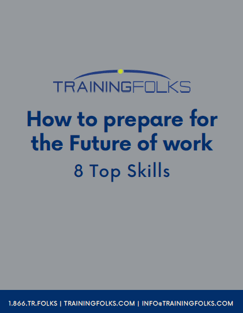How to Prepare Employees for Change | Future of Work

The future of work is rapidly changing, and businesses and employees need to adapt to keep up. With advancements in technology and automation, many jobs are becoming more specialized and digital. Remote work and flexible schedules are the norms, and the demand for a skilled and agile workforce is at an all-time high.
The future of work also involves developing new skills such as data analysis, coding, and digital marketing. Businesses need to invest in reskilling and upskilling their workforce, as well as embrace digital transformation, to stay competitive in the future. Additionally, employers are also expected to pay more attention to employee mental health and well-being, offering flexible and remote working options, and emphasizing the balance of work-life.
In addition to the new skills, companies are realigning and reorganizing their departments and roles and responsibilities which is increasing the amount of change felt by their employees.
So how can we help prepare for the future of work?
Make Evaluating Skills a Priority
Evaluating your employees' skills for the future of work is crucial to ensure they are equipped with the necessary knowledge and skills to succeed in their roles. Training needs assessment is a vital tool for identifying these skills gaps, and it's crucial to undertake this process regularly to keep up with the changing nature of work.
With a training needs assessment, you can identify which employees may be at risk of falling behind and need reskilling and develop a strategic plan to help them acquire the skills they need.
This approach can also help employers identify new opportunities and areas of growth for their employees and for the company. In addition, it will also be important for employee development, motivation, and job satisfaction. Conducting a training needs assessment is a proactive step in preparing your employees for the future of work, so they can thrive in the ever-changing business environment.
Create Meaningful Learning Opportunities
You can design learning opportunities to fill skill gaps with a targeted training program. Training should focus on building up the skills your employees will need to be successful in their roles within your company, now and in the future.
Creating meaningful learning opportunities is an essential aspect of preparing employees for the future of work. Rather than focusing on one-size-fits-all training programs, companies should design learning opportunities that are tailored to the specific needs of their employees. It's important to provide employees with a variety of options to suit different learning styles, such as eLearning, Instructor Led Training, Virtual Instructor Led Training, and Microlearning.
By providing meaningful learning opportunities, employees will feel more engaged, and motivated and will retain the information better. Furthermore, companies can also provide employees with opportunities to apply their new skills on the job, through projects, and real-world scenarios. This can be accomplished through cross-functional teams, job rotations, and internal training programs. Creating meaningful learning opportunities will not only help employees acquire new skills but also help the company to increase its competitiveness and adaptability to the future of work.
Implement Succession Planning Today
Implementing succession planning is crucial for ensuring the success of any company in the future of work. Succession planning helps to identify, develop, and prepare employees for key positions within the company. By identifying and nurturing potential leaders, companies can ensure a smooth transition when key positions become vacant and avoid disruptions to the business.
Implementing succession planning also ensures that the company has a strong pool of talent to draw on for future growth and expansion. Additionally, it will also provide employees with a clear career path and a sense of purpose in the organization. This will help companies to retain the best employees and build a culture of continuous learning and development.
Companies that start implementing succession planning today will have a significant advantage over those who wait until it's too late. It's never too early to start preparing for the future of work, and succession planning is an important part of that process.
Upskill and Reskill Your Workforce
Upskilling and reskilling your workforce is essential for companies to stay competitive in the future of work. With technological advancements and changes in business practices, employees need to continuously adapt to new skills and knowledge to keep up. By providing training and development opportunities, companies can ensure that their employees are equipped with the latest skills and knowledge they need to perform their jobs efficiently.
Reskilling is particularly important for those employees who may be at risk of becoming obsolete in the future, such as those working in manual labor, manufacturing, and administrative roles. Up-skilling, on the other hand, is the process of providing current employees with advanced skills that are vital for their current roles, as well as for future roles they may aspire to. Companies that invest in reskilling and upskilling their workforce will be well-positioned to take advantage of new opportunities and face the challenges of the future.
Some important skills to consider are:
-
Digital literacy and technology skills: As technology continues to play a significant role in the future of work, employees need to be proficient in the use of various digital tools and platforms, such as cloud-based software, data analysis, and coding.
-
Soft skills: Emotional intelligence, collaboration, problem-solving, and communication skills will become even more important as remote work and virtual teams become more prevalent.
-
Data analysis and data science: The ability to collect, analyze, and interpret large amounts of data will be critical for employees in a variety of roles, from marketing to product development.
-
Artificial Intelligence and Machine Learning: As Artificial Intelligence and Machine Learning are getting increasingly essential; employees will need to be familiar with these technologies and how to apply them to solve business problems.
-
Project management: With the increasing need for cross-functional teams and remote collaboration, project management skills will become essential for employees in all roles.
-
Critical Thinking and problem-solving: Companies are looking for employees who can think critically, identify, and solve problems, and make data-driven decisions.
-
Entrepreneurial skills: With the rise of the gig economy and new business models, employees will need to have the skills to think creatively, take risks, and be self-motivated.
-
Multilingualism: With the world becoming more globalized, the ability to communicate and understand different languages will become increasingly important in the future of work.
If you found this blog helpful and want to learn more,
be sure to download our FREE eBook:
How to prepare for the Future of Work - 8 Top Skills


